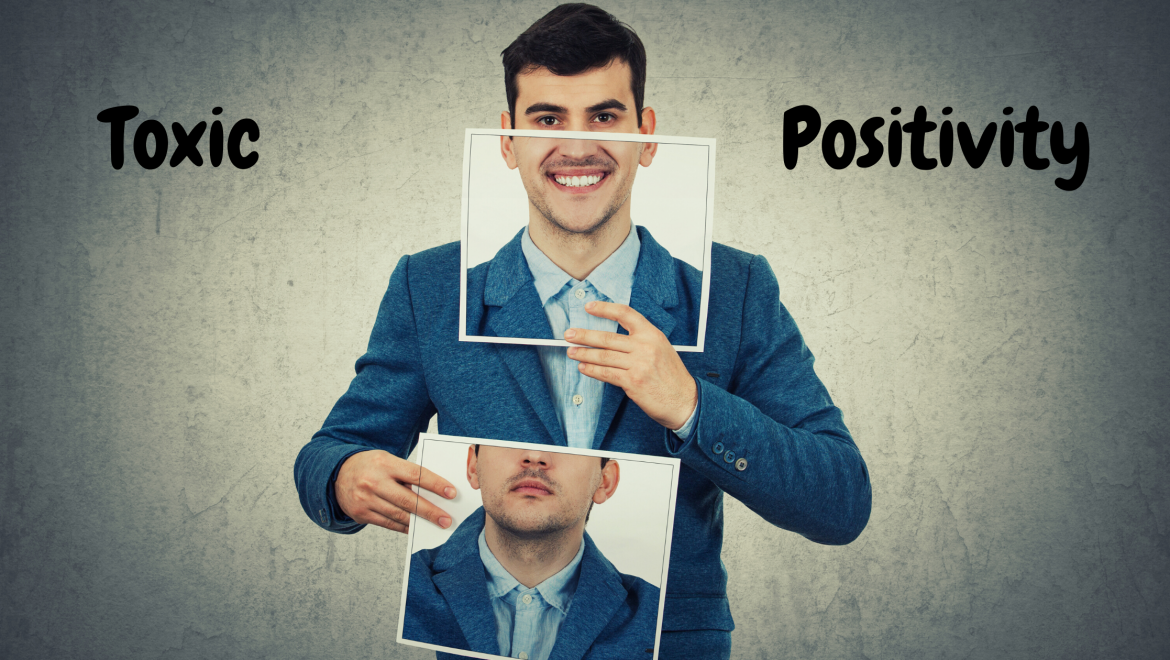Humans always thrive towards happiness. The constant changing dynamics of the present-day put a lot of redundant pressure on everyone to be perfectly sane and polished all the time. With the advent of social media, people constantly consume content of which is filtered to the brim, including the emotions. Those smiling pictures of family and friends ” having a positive attitude and outlook in like”, make us question our existence and tends to become emotional baggage. You could know you are unhappy but want to portray yourself being in high spirits. That is a problem! This is where the concept of “Toxic Positivity” germinates.

Meaning of Toxic Positivity:
Though sounds oxymoronic, the phrase “Toxic Positivity” refers to the culture that propagates the principle that keeping positive and seeing the bright side is the only right way to live. It envisages to focus on only positive things and rejecting anything that may trigger negative emotions. You are switched off to anything which might be negative or unpleasant. It wants you to be oblivious towards sadness or grief. While everyone needs a little pep-me-up from time to time, not everyone wants to be the poster boy/girl for perpetual positivity. There may be days when you want to just vent and whine, without being enveloped into some superficial ‘positive dust’. Normal human behaviour is to accept the emotions as they come and go, so when you hold onto positivity and refuse to acknowledge any sort of predicament, it deters the minds from feeling what it needs to feel- which is inhumane! “Good vibes only”, “you will be fine”, “just smile”, etc are peak examples of encouraging toxic positivity. It also snatches the cognitive ability to comprehend the various facets of life with a realistic prism of thought and thereby compromising on the preparedness of its repercussions.
Why is Toxic Positivity Bad for Health?
- Shame:
The oblivious attitude towards sadness or negative thoughts forces people to camouflage their honest emotions, primarily guided by the sentiment of ‘Shame’. Shame is crippling to the human spirit. Most of us don’t want to be seen as a drag or bad and are in constant pressure of being judged if we express ourselves.”If they knew about me, what would they think?” is a constant fear of shame and humiliation and thus the opportunity cost of toxic positivity. Freedom of Expression becomes a myth then.
- Suppressed Emotions :
Normal human behavior is to accept the emotions as and when they come and manifest sentiments as a normal course of emotional reflex. When you try to hold on to positivity and refuse to concede anything remotely negative by driving it away with a sickening overdose of positive nectar, you are ultimately paving the way for unhappiness.
- Relational Problems:
In this constant peer pressure of a joyous disposition of ourselves, we dwell in denial and begin to live unauthentically with ourselves and with the world. We tend to forget ourselves, making it difficult for others to relate to ourselves. We just adorn a deceptive cloak of happiness, whilst being scared little teddy bear longing for a hug. This, in turn, condescends the relationship with ourselves and also others.
- Unrealistic Expectations:
Every time you read an article of positivity and happiness, your mind tends to create a bubble of fair-style inside the head and more entitled to success. Once entitlement sets in, we coast and that can lead to our dreams fading away. Those who think pessimistically about their goals are more likely to achieve them. Hence the truth is clear. Too Much positivity=unrealistic expectations
How to deal with Toxic Positivity?
It is highly recommendable to strike a balance between positive and negative thoughts while addressing any aspect of life. This is a pragmatic approach in achieving life goals, without being forced into indulging in overly positive thoughts.
- Stop keeping a tally:
There is no standardized rule to balance between perfect happiness and negativity ration. Human emotions are very complex and dynamic in nature and change according to the circumstances of our existence. While there is a balance that should be maintained, that balance differs from person to person and situation to situation. So drop the tally and unleash authentic happiness.
- Accept the dark side:
Every individual has a dark side and it is as humane as it can get. It is necessary to temper our worldwide view appropriately. As complex creatures with complex emotions, embracing our darkness is essential to tackle our demons and establish personal development we need to create the life we need to thrive. This is key for self retrospection.
- Start being honest about how you feel:
Living in denial or oblivion about the true feelings and emotions, lead to emotional baggage and grief. We have to be honest with it, to deal with them effectively and efficiently. Emotions can be unpleasant but they exist for a reason. More often than not, they exist to abstain from perpetual hurt or depression. So honesty towards emotions is the key to activate the hidden powers to deal with problems in life.
- Self Compassion:
It is high time for people of this age, to be kinder towards themselves, to be able to forgive themselves. There might be failures and discomforts in life and it is not always necessary to attain the epitome of success to prove your worth. Self-esteem and self-worth should also be respected and catered to. Treat yourself with a bar of chocolate even when you lose in a race, no one will know!
- Aiming Deep Action:
Our feelings don’t stop when we head to work –but there’s a way to stay true to your feeling, whilst feeling empowered throughout the workday.That is to switch between “surface acting” and “deep acting”. Surface acting is like what customer service representative pretend a certain way- happy, energized, excited. While deep acting is an alternative where you try to feel the real emotion and act according, without any pressure of pretense or deception.
- Try Journaling:
One of the best tried and true methods of accepting our emotions is Journaling. So next time any strong emotion pops up, try putting pen to paper. It is an expressive writing exercise that makes us feel that somebody is listening, without any judgments. Journals are like a checkpoint between your emotions and the outside world, which helps us to connect better, devoid of any emotional baggage.
- Strike your Balance.
While advocating too much positivity being detrimental to emotional well-being, the same is true for pessimism or negative thoughts. Its all about figuring out what works best for you and embracing the emotions which come along from daily life. When balanced correctly, the optimistic and pessimistic thoughts paint a complete picture of reality that neither one can paint alone.
Conclusion
Keeping track of your emotions, no matter how dark and deep they are, and self-reflection are the key to achieving an emotional equilibrium in life. It will help you to better understand the things that no longer suit you and also those which empower you to do more. Positive thinking does not translate to escaping reality. It about seeing the good despite the worse. Instead of practicing toxic positivity, aim towards the balance of acceptance, whilst setting healthy boundaries.





Add Comment